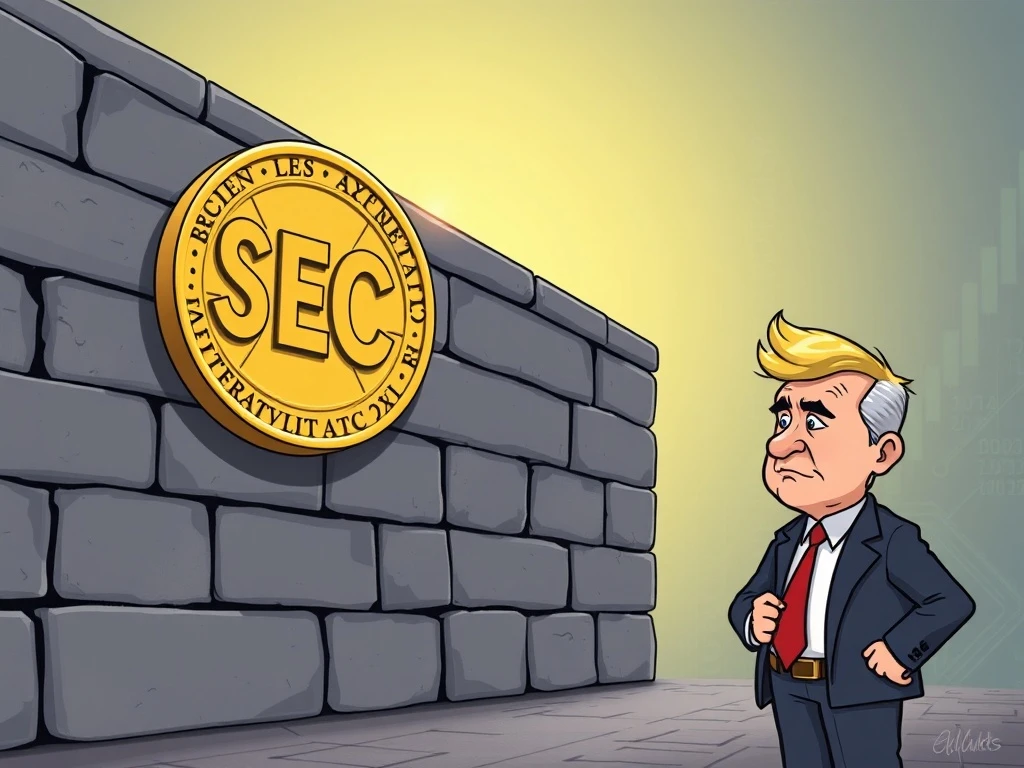Critical Inquiry: Can the Controversial TRUMP ETF Secure SEC Approval?

The cryptocurrency world often buzzes with innovation and regulatory challenges. Recently, a new filing has captured significant attention: Canary Capital’s proposal for a TRUMP ETF. This move aims to bring President Donald Trump’s memecoin, Official Trump (TRUMP), into the traditional investment landscape. However, the path to SEC approval appears fraught with significant hurdles, raising questions among industry experts. Specifically, ETF analyst Eric Balchunas has voiced concerns about the fund’s regulatory viability, sparking debate across financial circles. This development underscores the ongoing tension between novel crypto assets and established financial regulations.
Canary Capital’s Bold Move: A New Crypto ETF Proposal
Canary Capital recently made headlines by filing for a new exchange-traded fund, the Canary Trump Coin ETF. This proposed fund seeks to directly hold and offer exposure to the Official Trump (TRUMP) token. The token, launched in January, quickly gained traction, though it has since seen a significant price correction. Currently, Official Trump ($TRUMP) trades at approximately $8.40, a notable drop from its all-time high of $46.50 recorded on January 19, the day before Trump’s inauguration.
The very existence of the TRUMP token has generated considerable controversy. Critics argue that the token could facilitate anonymous influence buying with the president. Furthermore, it raises serious conflict of interest concerns, especially given Trump’s potential to shape future crypto policy. Despite these criticisms, Canary Capital pushes forward, aiming to integrate this unique digital asset into a regulated investment product. The filing represents a bold step, testing the boundaries of what regulators will permit within the crypto ETF landscape.
Eric Balchunas Questions the Path to SEC Approval
Bloomberg ETF analyst Eric Balchunas has publicly questioned the likelihood of the Canary Trump Coin ETF securing regulatory clearance. On Tuesday, Balchunas expressed skepticism on X (formerly Twitter) regarding the fund’s ability to navigate the complex regulatory environment. He specifically highlighted a key requirement for many ETFs: the existence of a live futures product on an exchange for at least six months. “That doesn’t exist as far as I can see,” Balchunas stated, indicating a potential roadblock for the proposed fund.
However, Balchunas also pointed out a possible alternative route for the TRUMP ETF: the Investment Company Act of 1940, often referred to as a “40 Act” fund. This regulatory pathway differs significantly from the one typically followed by other crypto ETFs, which require both a Form S-1 and a Form 19b-4. For instance, REX Shares utilized the 40 Act approach for its Solana (SOL) staking ETF. This distinction is crucial; it suggests a different set of regulatory considerations and a potentially less stringent approval process compared to standard crypto ETF filings.
The 40 Act Fund Strategy: A Regulatory End-Around?
The 40 Act fund strategy presents an intriguing, albeit debated, method for bringing crypto-related products to market. REX Shares, a firm with experience in this area, has also filed for a TRUMP-tracking ETF under the 40 Act. Their proposed strategy involves buying shares in an offshore company that holds the token. Nate Geraci, president of ETF Store, described this approach as “a regulatory end-around.” This description implies that such filings might seek to circumvent some of the more direct regulatory hurdles faced by conventional crypto ETFs.
While the 40 Act path might offer a workaround, it does not eliminate all risks or concerns. Canary Capital’s filing explicitly states that the TRUMP ETF may not be suitable for all investors. “The shares are speculative securities,” the filing added, warning shareholders about the heightened risks involved. This transparency is vital, ensuring potential investors understand the speculative nature of such an investment. The regulatory environment remains complex, and even alternative pathways carry their own unique challenges and investor considerations.
Industry Warnings and Future Outlook for the TRUMP ETF
The broader crypto ETF market is also experiencing calls for caution. Greg King, CEO of REX Financial, recently warned ETF issuers about the inherent risks of tracking less-established cryptocurrencies. He advised issuers to be selective, noting that the market “gets pretty sketchy below the top 10, certainly below the top 20.” This warning underscores the volatility and potential for manipulation in smaller market cap tokens, a category that the Official Trump (TRUMP) token currently occupies.
Canary Capital established the legal entity for its Trump Coin ETF with the Delaware State Department on August 14. This formal step indicates a serious commitment to the project, despite the significant regulatory questions. The future of the TRUMP ETF hinges on how the SEC interprets these novel filings and whether the proposed structures adequately protect investors. As the crypto landscape evolves, the outcome of this particular crypto ETF application will undoubtedly set precedents for future digital asset investment products seeking SEC approval. Investors and industry observers will closely monitor developments surrounding Canary Capital and the insights from Eric Balchunas.









